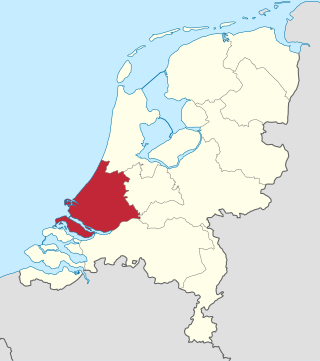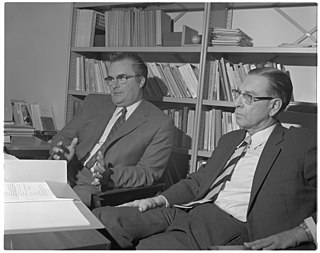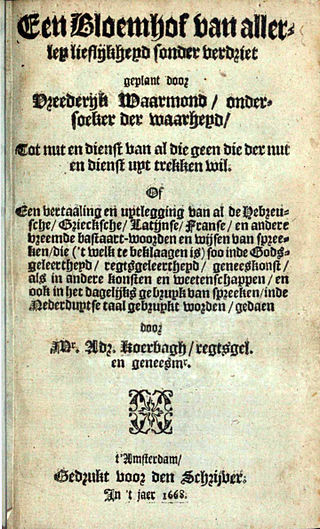Notes
- 1 2 "prof.dr. (Wiep) L van Bunge". www.eur.nl.
- ↑ "Wiep van Bunge". Royal Netherlands Academy of Arts and Sciences. Archived from the original on 23 August 2017.
Louis (Wiep) van Bunge (born 1960) is a Dutch historian of philosophy. He has published mainly on the early Enlightenment in the Netherlands, on Spinoza and on his influence on other thinkers.
Van Bunge was born at The Hague on 22 May 1960. He graduated B.A. and M.A. in philosophy at Utrecht University. He obtained his doctorate at Erasmus University in Rotterdam with a dissertation on Johannes Bredenburg. [1]
From 2004 to 2012 van Bunge was Dean of the Faculty of Philosophy at Erasmus University, where he has been a professor since 2000. He is a member of the Royal Netherlands Academy of Arts and Sciences (2014), [2] and of the Koninklijke Hollandsche Maatschappij der Wetenschappen. [1] Director of a research project of the Netherlands Organisation for Scientific Research on the Dutch early enlightenment in the period 2000-2005, he was co-director of another affiliated project on the same subject in the period 2010-2014. He has been co-editor of publications on and around Spinoza, and is a former editor of the journal Geschiedenis van de wijsbegeerte in Nederland .
Van Bunge was born into the Van Bunge family of Dutch nobility, and has the title Jonkheer. He is the son of Lodewijk Frederik Wilhelmus Maria van Bunge (1926–2009), journalist, and his second wife Ellie Lenie Emma Uitenbroek (born 1938), also a journalist .

South Holland is a province of the Netherlands with a population of over 3.7 million as of October 2021 and a population density of about 1,373/km2 (3,560/sq mi), making it the country's most populous province and one of the world's most densely populated areas. Situated on the North Sea in the west of the Netherlands, South Holland covers an area of 3,307 km2 (1,277 sq mi), of which 607 km2 (234 sq mi) is water. It borders North Holland to the north, Utrecht and Gelderland to the east, and North Brabant and Zeeland to the south. The provincial capital is the Dutch seat of government The Hague, while its largest city is Rotterdam. The Rhine-Meuse-Scheldt delta drains through South Holland into the North Sea. Europe's busiest seaport, the Port of Rotterdam, is located in South Holland.

Johan Huizinga was a Dutch historian and one of the founders of modern cultural history.
Richard Henry Popkin was an American academic philosopher who specialized in the history of enlightenment philosophy and early modern anti-dogmatism. His 1960 work The History of Scepticism from Erasmus to Descartes introduced one previously unrecognized influence on Western thought in the seventeenth century, the Pyrrhonian Scepticism of Sextus Empiricus. Popkin also was an internationally acclaimed scholar on Christian millenarianism and Jewish messianism.

Erasmus University Rotterdam is a public research university located in Rotterdam, Netherlands. The university is named after Desiderius Erasmus Roterodamus, a 15th-century humanist and theologian.

Wander Johannes de Haas was a Dutch physicist and mathematician. He is best known for the Shubnikov–de Haas effect, the De Haas–Van Alphen effect and the Einstein–de Haas effect.

Balthasar Bekker was a Dutch minister and author of philosophical and theological works. Opposing superstition, he was a key figure in the end of the witchcraft persecutions in early modern Europe. His best known work is De Betoverde Weereld (1691), or The World Bewitched (1695).

Pieter van Musschenbroek was a Dutch scientist. He was a professor in Duisburg, Utrecht, and Leiden, where he held positions in mathematics, philosophy, medicine, and astronomy. He is credited with the invention of the first capacitor in 1746: the Leyden jar. He performed pioneering work on the buckling of compressed struts. Musschenbroek was also one of the first scientists (1729) to provide detailed descriptions of testing machines for tension, compression, and flexure testing. An early example of a problem in dynamic plasticity was described in the 1739 paper.
Jonathan Irvine Israel is a British writer and academic specialising in Dutch history, the Age of Enlightenment and European Jews. Israel was appointed as Andrew W. Mellon Professor in the School of Historical Studies at the Institute for Advanced Study, Princeton, New Jersey, in January 2001 and retired in July 2016. He was previously Professor of Dutch History and Institutions at the University College London.
Adriaan Koerbagh was a Dutch scholar and writer who was a critic of religion and conventional morality.
Eric Walten (1663–1697) was a Dutch Enlightenment thinker and pamphleteer, notably accused of blasphemy and of secretly following the philosophical thinking of Benedict Spinoza in the 1690s.

Antonius Adrianus Gerardus Maria "Ronald" van Raak is a Dutch politician, non-fiction writer and former academic. A member of the Socialist Party, he has been a member of the House of Representatives since 30 November 2006. He focuses on matters of home affairs, kingdom relations, the royal house and general affairs. From 2003 to 2006, he was a Senator of the Netherlands.

Lodewijk Meyer was a Dutch physician, classical scholar, translator, lexicographer, and playwright. He was a radical intellectual and one of the more prominent members of the circle around the philosopher Benedictus de Spinoza.
Jacobus Wittichius (1677–1739) was a German-Dutch philosopher, a Cartesian and follower of Burchard de Volder, and holder of controversial views on the nature of God.
Samuel Naeranus (1582–1641) was a Dutch Remonstrant minister and neo-Latin poet, exiled in 1619 after the Synod of Dort.
Ordinum Hollandiae ac Westfrisiae pietas is a 1613 book on church polity by Hugo Grotius. It was the first publication of Grotius, a prominent jurist and Remonstrant, concerned with the Calvinist-Arminian debate and its ramifications, a major factor in the politics of the Netherlands in the 1610s. The Ordinum pietas, as it is known for short, gave a commentary on the Five Articles of Remonstrance of 1610 that were the legacy of the theological views of Jacobus Arminius, who died in 1609.
This is a timeline of philosophy in the 17th century.

Willem Hendrik Somermeyer was a Dutch economist, Professor in Econometrics at the Erasmus University Rotterdam, and member of the Royal Netherlands Academy of Arts and Sciences, particularly known for his consumption-savings model.

Een Bloemhof[əm ˈblumɦɔf] is a dictionary published in 1668 and written by Adriaan Koerbagh under his own name. Its full title was Een Bloemhof van allerley Lieflijkheyd sonder verdriet. The book sparked controversy in Amsterdam because of its articles defining political and religious terms, even though they comprise only a small portion of the overall dictionary. The book also offers laymen explanations for technical jargon and foreign terms, covering topics such as medicine and law.
Dutch philosophy is a broad branch of philosophy that discusses the contributions of Dutch philosophers to the discourse of Western philosophy and Renaissance philosophy. The philosophy, as its own entity, arose in the 16th and 17th centuries through the philosophical studies of Desiderius Erasmus and Baruch Spinoza. The adoption of the humanistic perspective by Erasmus, despite his Christian background, and rational but theocentric perspective expounded by Spinoza, supported each of these philosopher's works. In general, the philosophy revolved around acknowledging the reality of human self-determination and rational thought rather than focusing on traditional ideals of fatalism and virtue raised in Christianity. The roots of philosophical frameworks like the mind-body dualism and monism debate can also be traced to Dutch philosophy, which is attributed to 17th century philosopher René Descartes. Descartes was both a mathematician and philosopher during the Dutch Golden Age, despite being from the Kingdom of France. Modern Dutch philosophers like D.H. Th. Vollenhoven provided critical analyses on the dichotomy between dualism and monism.
Jean-Maximilien Lucas was a French bookseller and publisher, resident in the Netherlands from around 1667. He is now known as the first biographer of Baruch Spinoza.